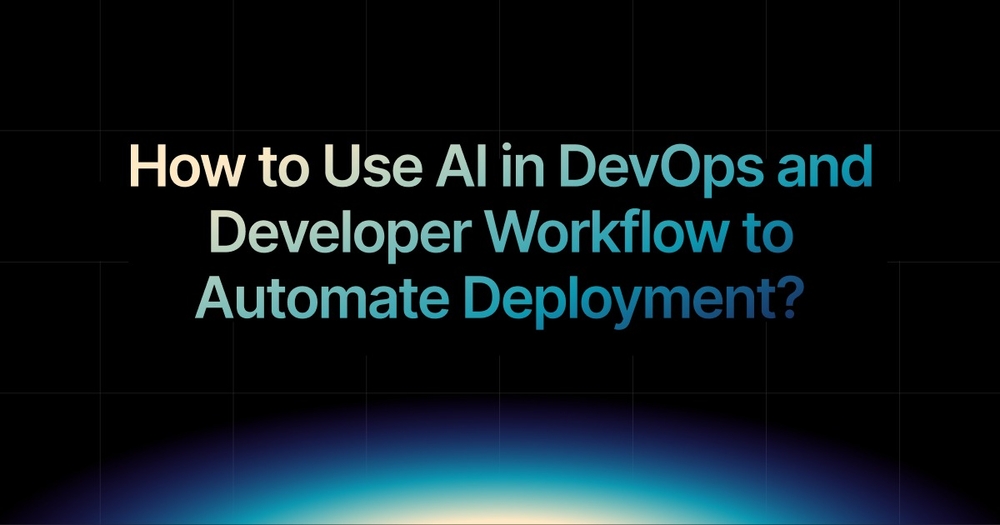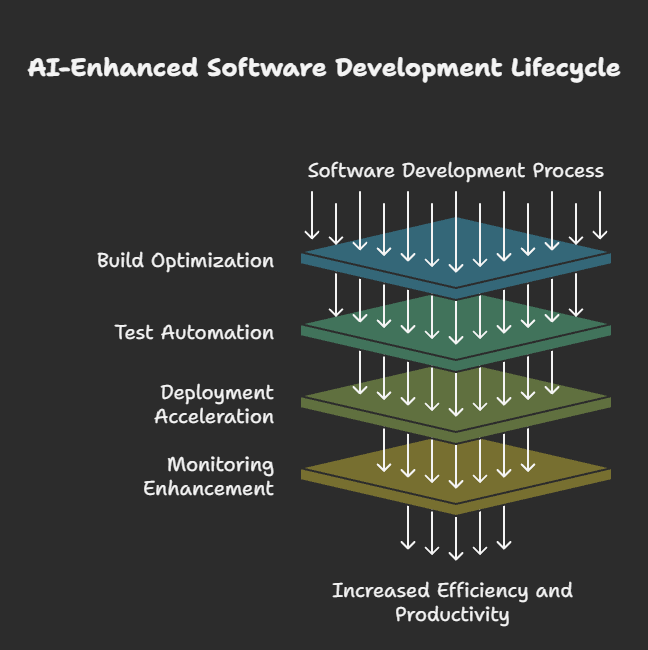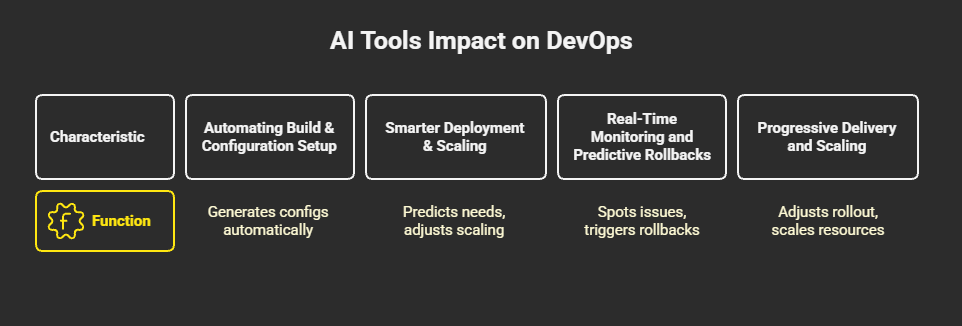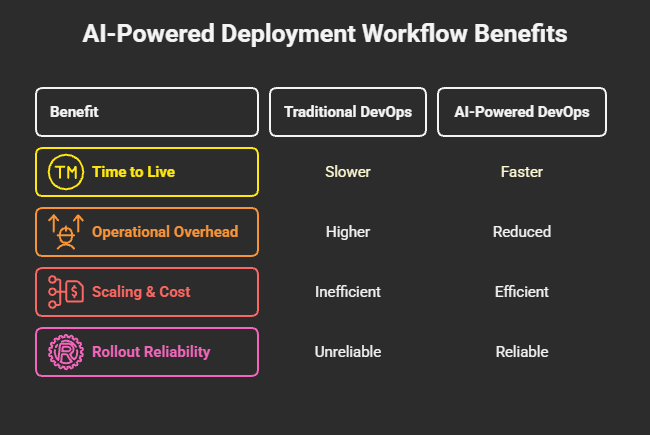Published
- 11 min read
How to Use AI in DevOps and Developer Workflow to Automate Deployment?

AI in DevOps and developer workflow is transforming how teams handle deployments by eliminating bottlenecks, reducing human error, and accelerating release cycles.
Traditional DevOps workflows often struggle with manual steps, slow feedback loops, and reactive issue resolution. These challenges become even more apparent as applications scale or when multiple environments need to be managed in parallel.
AI is not just another tool in the stack.
It brings intelligence to the deployment pipeline, making sense of logs, predicting issues before they occur, automating routine tasks, and enabling real-time decision-making.
From configuration to monitoring, AI is quickly becoming the invisible assistant that keeps your deployment flow fast, safe, and efficient.
In this blog, we’ll explore what AI in DevOps really means, how AI automates deployments, key use cases of AI DevOps tools, and why Kuberns is leading the way in AI-first deployment workflows.
What Does “AI in DevOps and Developer Workflow” Really Mean?

AI in DevOps and developer workflow refers to the use of artificial intelligence to optimise, automate, and accelerate the software development lifecycle from build and test to deployment and monitoring.
According to a DevOps.com study, 20% of organisations now use AI across all phases of the software development lifecycle, and another 24% are already exploring AI tools for deployment, testing, security, and observability. Notably, 60% of these teams report significant gains in efficiency and productivity.
Unlike traditional automation tools, AI DevOps tools don’t just follow instructions. they learn, predict, and adapt based on context. This means fewer failures, faster delivery, and less time spent on repetitive tasks.
In a developer’s daily workflow, AI can:
- Auto-generate deployment scripts based on code context
- Predict and prevent failures before they reach production
- Identify performance bottlenecks and suggest fixes
- Automate rollbacks and notify only when necessary
Want to see real-world examples of AI DevOps in action? Explore this guide on how AI tools automate deployments and learn how teams reduce manual setup time using AI.
How AI Automates Deployments in DevOps?
 The deployment process is one of the most error-prone and time-consuming parts of the software lifecycle. With the introduction of AI DevOps tools, teams can now automate and optimise everything from infrastructure provisioning to rollout validation without writing manual scripts or dealing with complex YAML.
The deployment process is one of the most error-prone and time-consuming parts of the software lifecycle. With the introduction of AI DevOps tools, teams can now automate and optimise everything from infrastructure provisioning to rollout validation without writing manual scripts or dealing with complex YAML.
Here are the key ways AI tools for DevOps are transforming modern workflows:
AI for Automating Build & Configuration Setup
Instead of writing deployment configs manually, AI DevOps tools now scan your codebase, detect your stack, and auto-generate everything from Dockerfiles to Helm charts.
What used to take hours, copy-pasting templates, fixing syntax, and running test deploys can now happen in seconds. For developers, this means faster iterations and fewer chances to introduce config errors.
Curious how this works in real projects? See this guide to AI tools for deployment to learn how teams are using AI to skip the manual setup phase entirely.
AI-Powered Smarter Deployment & Scaling
Once you’re ready to ship, AI kicks in again. This time to manage the rollout. AI-powered deployment tools optimise the process by predicting infrastructure needs, analysing live traffic, and adjusting scaling automatically.
Instead of relying on hardcoded thresholds, AI adapts to real usage patterns, keeping systems stable without human intervention.
AI for Real-Time Monitoring and Predictive Rollbacks
Even after deployment, AI continues to work behind the scenes. By monitoring logs and performance data in real time, it can spot issues before they escalate. If something goes wrong, AI can trigger a rollback automatically, no waiting for an engineer to notice a spike or sift through logs.
Read this breakdown to see how modern DevOps platforms are using AI to catch failures early and respond instantly.
AI for Progressive Delivery and Scaling
Canary deployments and blue-green rollouts are safer than big-bang releases, but still require complex configuration. AI simplifies this by learning how past releases behaved and dynamically adjusting the rollout strategy based on user impact and system performance.
AI can also detect when your app is under strain and proactively scale resources up or shut them down when idle, optimising cost and performance.
From start to finish, AI DevOps tools are removing the friction in deployment pipelines, letting developers focus on code, not infrastructure or incident response.
How Kuberns Uses AI to Simplify Deployments
 Most AI DevOps tools require configuration, plugin setup, or expensive enterprise licenses to get started. Kuberns takes a different approach; it’s built from the ground up with AI in the developer workflow at the core, not as an add-on.
Most AI DevOps tools require configuration, plugin setup, or expensive enterprise licenses to get started. Kuberns takes a different approach; it’s built from the ground up with AI in the developer workflow at the core, not as an add-on.
One-Click Setup. No YAML Required.
With Kuberns, you don’t need to define build pipelines or write complex deployment scripts. Just connect your repo, and the platform uses AI behind the scenes to detect your framework, language, and required services. It auto-generates a secure, production-ready pipeline, no config files needed.
Smarter Build and Environment Detection
Traditional CI/CD requires manual setup for every environment. Kuberns removes that. Its AI engine scans your code and infrastructure, flags missing dependencies, optimises build steps, and suggests environment variables, before you even run the first deployment.
Learn how Kuberns removes CI/CD friction by eliminating manual workflow
Automated Scaling Based on Real Patterns
Kuberns uses AI for DevOps to analyse past traffic, app usage, and system metrics. It then predicts spikes and adjusts resources automatically, even before problems occur. This goes beyond simple CPU/memory triggers used in standard autoscaling.
Safer Rollouts with Real-Time AI Monitoring
Every deployment on Kuberns is monitored in real time using built-in AI deployment tools. If errors, latency spikes, or abnormal patterns are detected, Kuberns can halt or roll back the deployment without waiting for manual intervention.
Want a full breakdown of AI tools in action? Check how AI can automate the whole deployment workflow
Benefits of an AI-Powered Deployment Workflow
 For developers, the goal isn’t just to deploy, it’s to deploy confidently, quickly, and without unnecessary complexity.
For developers, the goal isn’t just to deploy, it’s to deploy confidently, quickly, and without unnecessary complexity.
Traditional DevOps pipelines often involve custom scripting, fragile integrations, and constant firefighting. But with AI, the workflow shifts from reactive to intelligent and automated.
Here are the key benefits of using an AI-powered deployment workflow:
Faster Time to Live
Manual steps in CI/CD slow down releases. With AI DevOps tools, the build, test, and deploy stages are automatically optimised. AI removes bottlenecks, recommends fixes, and even handles post-deployment verification, so your features reach production faster.
Whether you’re shipping daily or weekly, AI for DevOps ensures each cycle moves quickly and with less effort from the team.
Reduced Operational Overhead
Teams spend countless hours writing scripts, managing pipelines, and monitoring rollouts. AI handles most of that heavy lifting. By detecting anomalies, configuring environments, and scaling automatically, AI tools for DevOps cut down the need for manual intervention, especially during high-pressure releases.
This means fewer alerts, less firefighting, and more focus on building the product.
Cost Efficiency & Smarter Scaling
Traditional autoscaling often results in over-provisioning. AI learns from usage patterns, predicts traffic spikes, and adjusts resources precisely when needed. This leads to more efficient infrastructure usage, without sacrificing performance.
Reliable Rollouts
Bad deployments happen. But with AI in DevOps, they don’t have to impact users. Real-time monitoring, automatic rollback triggers, and continuous verification make rollouts safer. AI identifies issues early and responds faster than a human could.
Don’t Just Read About AI-Powered DevOps, Try It.
Reading about AI in DevOps and developer workflow is one thing. Actually experiencing it is where the real shift happens. Whether you’re deploying your first app or managing dozens of microservices, the difference with AI tools like Kuberns is immediate.
No manual configurations. No waiting for DevOps support. Just smart, automated, and reliable deployments powered by AI.
Try AI-Powered Deployment today

People Also Ask
1. What is AI in DevOps, and how does it help developers?
A: AI in DevOps refers to the use of machine learning and intelligent automation to improve processes like code integration, testing, deployment, and monitoring. For developers, it means fewer manual steps, automated rollbacks, smarter scaling, and faster release cycles.
2. Which AI tools are used in DevOps pipelines?
A: Common AI tools include platforms that auto-generate CI/CD pipelines, predict system failures, handle autoscaling, and automate infrastructure configuration. Tools like Kuberns use AI to streamline the entire DevOps workflow from code to deployment without writing YAML or managing infrastructure manually.
3. How does AI improve DevOps workflows?
A: AI improves DevOps workflows by detecting errors early, automating repetitive tasks, predicting performance issues, and enabling faster, safer deployments.
4. Can AI automate software deployment?
A: Yes. AI deployment tools can fully automate the build, test, and deployment pipeline. They can also monitor rollouts in real time and trigger auto-rollbacks if something goes wrong.
5. How does Kuberns use AI for deployment?
A: Kuberns uses AI to auto-configure pipelines, detect build issues, choose optimal deployment strategies, and scale infrastructure based on usage patterns, all with minimal setup.
6. Is AI-powered DevOps suitable for small teams?
A: Absolutely. AI reduces the need for manual setup and infrastructure management, making it ideal for solo developers, startups, and small teams without full-time DevOps support.
7. Can I use AI for CI/CD without deep DevOps knowledge?
A: Yes. Platforms like Kuberns are designed specifically for developers with little or no DevOps background. The system handles build logic, deployment orchestration, and monitoring using AI-powered automation, so you can ship confidently without managing pipelines manually.